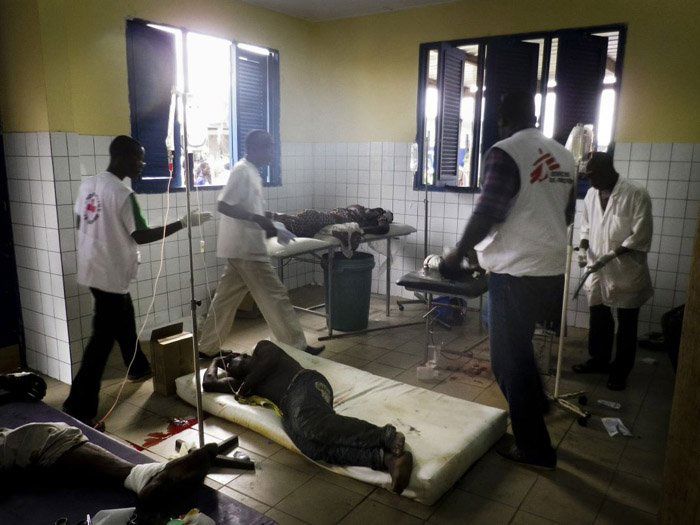According to the UNHCR, close to 30,000 refugees have been fleeing post-election violence and tensions in Ivory Coast. Most of the Ivorian refugees are hosted in villages along the border in Nimba County. An MSF team is currently providing healthcare services to these refugees.
The UNHCR have set to establish a camp in Bahn, located 50 km west from the Ivorian border. The camp would cater between 15,000 to 18,000 Ivorian refugees. MSF would provide health care to the camp if necessary. It remains unclear how many of these refugees would be willing to be transferred to the UNHCR camp.
Since Saturday January 22, MSF has been monitoring the refugee situation along the border through mobile clinics by providing free primary health care. Within the first four days, the medical team carried out 763 consultations, particularly for diarrhea and respiratory infections. MSF is also undertaking epidemic surveillance and would respond in case of outbreaks, such as measles.
The mobile clinics are expected to continue for several weeks. An assessment of the number of refugees moving towards the camp and their health needs will determine the possibilities of an MSF intervention in the camp.
In Western Ivory Coast (Duékoué), MSF is already providing primary and secondary health care to displaced and the local populations.
MSF has provided medical humanitarian aid in Liberia since 1990. The handover of its last hospital services in June 2010 is the most significant reduction of activities during the organization’s two decade presence in the country. MSF remains in Liberia to support the Ministry of Health & Social Welfare to address sexual violence.
The UNHCR have set to establish a camp in Bahn, located 50 km west from the Ivorian border. The camp would cater between 15,000 to 18,000 Ivorian refugees. MSF would provide health care to the camp if necessary. It remains unclear how many of these refugees would be willing to be transferred to the UNHCR camp.
Since Saturday January 22, MSF has been monitoring the refugee situation along the border through mobile clinics by providing free primary health care. Within the first four days, the medical team carried out 763 consultations, particularly for diarrhea and respiratory infections. MSF is also undertaking epidemic surveillance and would respond in case of outbreaks, such as measles.
The mobile clinics are expected to continue for several weeks. An assessment of the number of refugees moving towards the camp and their health needs will determine the possibilities of an MSF intervention in the camp.
In Western Ivory Coast (Duékoué), MSF is already providing primary and secondary health care to displaced and the local populations.
MSF has provided medical humanitarian aid in Liberia since 1990. The handover of its last hospital services in June 2010 is the most significant reduction of activities during the organization’s two decade presence in the country. MSF remains in Liberia to support the Ministry of Health & Social Welfare to address sexual violence.


